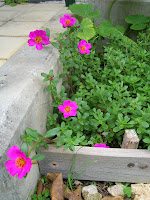 The Japanese are master gardeners. They are a people sensitive to the seasons, with an exquisite appreciation of colour. Almost every house has a garden, most often planted in a ramshackle collection of pots, but sometimes elegantly landscaped. On Okinawa, many people also have their own vegetable patches, or, if space permits, larger fields with crops ranging from sugarcane to taro to papaya to cauliflower. It is hard not to be inspired by all this, and strike out into your own yard.
The Japanese are master gardeners. They are a people sensitive to the seasons, with an exquisite appreciation of colour. Almost every house has a garden, most often planted in a ramshackle collection of pots, but sometimes elegantly landscaped. On Okinawa, many people also have their own vegetable patches, or, if space permits, larger fields with crops ranging from sugarcane to taro to papaya to cauliflower. It is hard not to be inspired by all this, and strike out into your own yard.Seeds are relatively expensive at Japanese stores, and the variety is not great. So, should you care to plant from seed, best to bring your own supply. Seedlings are available at low cost from home improvement stores like MakeMan and the Ginowan plaza home store, as well as at local family-owned nurseries. All these stores tend to carry seasonal plants, but each has a slightly different selection and pricing, so best to shop around. Soil is a bit expensive at these stores, but if your goal is planting a few pots, it works out fine. The 100Y shops (especially the one in Ginowan plaza) are a great source for gardening accessories including pots and saucers, stakes and wire cages, ties / twins, hand shovels (available in a rainbow of colors), and more. Gaijin trash heaps and PCS sales are also a rich source of plants and pots.
Soil quality is not great in many of the places where gaijin live. The bases were often built up artificially with fill, so the soil is hard-packed clay with very little topsoil. Drainage can be a problem. Thus, in order to plant in the ground the soil must be improved and built up a bit to improve drainage. This requires some sand, decent organic material, and bagged soil / acquired topsoil.
Also, the soil is alkaline (pH 7-9) and seems to be devoid of some key nutrients. There are a couple of ways to address the alkalinity (when one does an internet search on the topic.) We have used coffee ground dug into the soil or scattered around on top. These can be from personal consumption, or from Starbucks. Per a company recycling policy, if you drop off a pail with lid at Starbucks and leave them your contact info, they will fill it with used grounds and call you to pick it up when it's full. Apparently, elemental sulfur works better for this purpose than coffee, but is more difficult to obtain. In addition, one can fertilize with an acidifying product (ammonium based fertilizers will do this - urea, ammonium sulfate/nitrate/phosphate). Regular application of fertilizer is essential should you plan to grown any veggies, and really helps ornamentals.
Weeds are another issue. When planting in the ground, the edges must be protected from grass encroachment with barriers that extend several centimeters into the ground, and on top plastic sheeting or mulch is advisable to prevent wind and soil-borne weeds. The 3 leaf clover is ubiquitous and must be pulled out from its bulb.
Pests are a challenge anywhere, and Okinawa is no different. Local plants seem to do well, but veggies, herbs, and ornamentals like roses suffer from all sorts of things: powdery fungus, viral rust, spider mites, leafminer, caterpillars, aphids, etc. We gave up on organic methods a while back, and are using various fungicidal and insecticidal mists (of course different products on edibles and ornamentals). Beware the plants in the sale counter at the nurseries, these sometimes suffer from early-stage infestations.
Water requirements depend on a variety of factors. Pots in the full summer sun go through huge amounts of water. The ground retains a lot of moisture here, and it rains with regularity even in the summer, so ground plantings need less frequent attention. 
The subtropical climate and lack of winter freeze means one can plant at any time in the year, but growth and flowering really picks up as the spring starts (late March). Plants that do really well, with almost no work, are bougainvillea, hibiscus, small crawling succulents (see photo of purple flowers), coleus varieties (http://www.bakersacresgreenhouse.com/Wholesaleliners.htm), ferns, and taro plants. The coleus, geraniums, and the succulent plants are really easy to root - just break off a piece from your friend's plant and stick it in the ground, water regularly, and off it goes. Bougainvilleas can also be propagated from cuttings, although it is reportedly a bit more difficult (http://www.southeasttexasgardening.info/bouginfo.htm). Jasmine, passiflora, ixoras, abutilons, pachystachys lutes (lollipop flower), geraniums, begonias, and lots of other tropicals grow like crazy once established. Roses and gardenias struggle a bit unless soil/pest control is maintained. All the herbs need babying and some attention to soil/pests, but 
 do well once established: thyme, rosemary, mint, sage, basil, cilantro, lemongrass, chives, etc. Tomatoes, peppers, eggplant, and squash all do OK here, if they get enough attention. If you plan to be in Okinawa more than 3 years, plant a few fruiting trees / vines on arrival. Banana, papaya, citrus, and passionfruit are all cultivated on Okinawa. MakeMan also sells kiwi, fig, lychee, and other tropical species.
do well once established: thyme, rosemary, mint, sage, basil, cilantro, lemongrass, chives, etc. Tomatoes, peppers, eggplant, and squash all do OK here, if they get enough attention. If you plan to be in Okinawa more than 3 years, plant a few fruiting trees / vines on arrival. Banana, papaya, citrus, and passionfruit are all cultivated on Okinawa. MakeMan also sells kiwi, fig, lychee, and other tropical species.